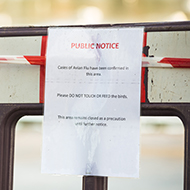Second avian influenza case confirmed in Scotland

A range of control measures are in place within the zones.
Highly pathogenic avian influenza (H5N1) has been confirmed in a flock of around 14,000 gamebirds at a rearing premises in Levan, Fife.
The Scottish government confirmed that all birds at the affected site are being humanely culled. A Protection Zone (PZ) of 3 km and a Surveillance Zone (SZ) of 10 km have also been placed around the infected premises to curb the risk of disease spread.
A range of control measures are in place within the zones, including restrictions on the movement of eggs, poultry, carcasses, used poultry litter and manure. Public health advice remains that the risk to human health from the virus is very low.
This is the second case of avian influenza to be confirmed in Scotland in recent months. In December, the Scottish government identified highly pathogenic avian influenza (H5N8) in a flock of birds on the island of Sanday in Orkney.
Scotland’s Chief Veterinary Officer Sheila Voas said: “This highly pathogenic strain of avian influenza (H5N1) has been confirmed on a farm of approximately 14,000 mixed gamebirds with high mortality in the last few days. All remaining birds are being humanely culled for disease control purposes.
“It is vital that keepers take steps to improve their biosecurity and protect their birds from disease. Keepers who are concerned about the health or welfare of their flock should seek veterinary advice immediately. Your private vet, or your local Animal and Plant Health Agency office, will also be able to practical provide advice on keeping your birds safe from infection.”
Bird keepers and producers are being reminded to comply with the order to house birds that came in to effect on the 14 December 2020, or ensure they are kept separate from wild birds and follow biosecurity procedures.
Rural affairs minister Ben Macpherson said: “Following this confirmation I have put in place controls required under domestic and EU legislation that will help control any further spread of the disease in the surrounding area. We ask that the public remain vigilant and report any findings of dead wild birds. People should not handle the birds."



 The latest
The latest